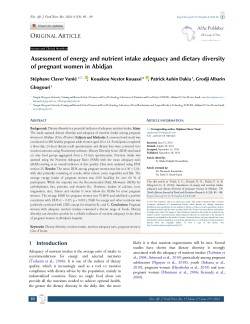Main Article Content
Assessment of energy and nutrient intake adequacy and dietary diversity of pregnant women in Abidjan
Abstract
Background: Dietary diversity is a potential indicator of adequate nutrient intake.
Aims: The study assessed dietary diversity and adequacy of nutrient intake among pregnant women in Abidjan (Côte d’Ivoire).
Subjects and Methods: A cross-sectional study was conducted on 389 healthy pregnant adult women aged 20 to 43. Participants completed a three-day, 24-hour dietary recall questionnaire and dietary data were converted into nutrient amounts using Nutrisurvey software. Dietary Diversity Score (DDS) was based on nine food groups aggregated from a 15-item questionnaire. Nutrient intake was assessed using the Nutrient Adequacy Ratio (NAR) with the mean adequacy ratio (MAR) serving as an overall indicator of diet quality. Data were analyzed using SPSS version 25.
Results: The mean DDS among pregnant women was low at 4.30 ± 1.04, with diet primarily consisting of cereals, white tubers, roots, vegetables and fish. The average energy intake of pregnant women was 2429 kcal/day for over 60 % of participants. While the majority met the Recommended Daily Allowance (RDA) for carbohydrates, fats, proteins, and vitamin B12. However, intakes of calcium, iron, magnesium, zinc, folates and vitamin C were below the RDAs for most pregnant women. The average MAR for pregnant women was 70.86% and exhibited a positive correlation with DDS (r = 0.37; p < 0.001). NAR for energy and other nutrients was positively correlated with DDS, except for vitamins B12 and C.
Conclusions: Pregnant women with adequate nutrient intakes consumed a diverse range of foods. Dietary diversity can therefore provide be a reliable indicator of nutrient adequacy in the diets of pregnant women in Abidjan’s hospital.







